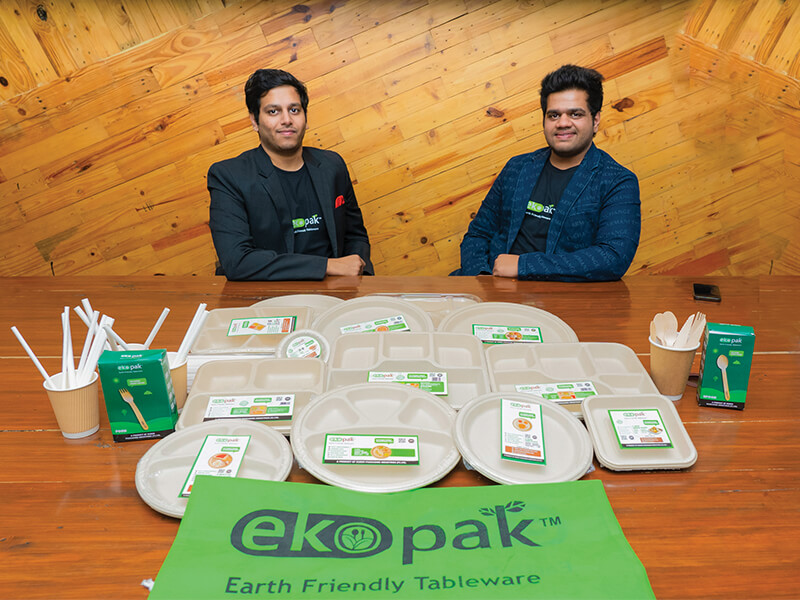The core strength of the brand is the product range which is ‘backyard’ compostable within 90 days making it optimal to replace single-use plastics.

Ekopak is a brand of Kuber Packaging Industries Pvt. Ltd. created with the thought of making the most sustainable packaging in the most ethical way possible. Made from sugarcane pulp, the products are touted to be 100 percent natural, compostable, biodegradable and toxic-free. In a conversation with Paper Mart, Mr. Sanchit Gupta and Mr. Uchit Gupta, Directors at Kuber Packaging Industries Pvt. Ltd. presents an overview of the brand, views on the compostable tableware market in the country, and future plans for the company.
Paper Mart: Could you please present an overview of Ekopak and the objectives behind establishing the brand?
Sanchit Gupta: Founded in 2020 by Uchit Gupta and me, Ekopak takes pride in being the first sustainable tableware manufacturing brand in South India. An earth-friendly tableware brand under Kuber Packaging Industries, we are the only ones to manufacture and provide all eco-friendly alternatives to single-use plastic disposables mainly tableware in-house. The core reason behind setting up the brand was the environmental impact that plastic was causing on our mother earth. Plastic pollution costs USD 13 billion in economic damage annually, which is a very frightening number for our future survival. Ekopak is a green-field company and ensures to drive the market by offering certified moulded fiber alternatives to brands to eliminate and eradicate the usage of single-use plastics.
PM: Kindly guide us through some of the key strengths of the brand and your product offerings.
Uchit Gupta: Ekopak’s moulded-fiber tableware range is designed and manufactured in an ISO Certified facility located in Hyderabad. The core strength of the brand is the product range which is ‘backyard’ compostable within 90 days making it optimal to replace single-use plastics for a cleaner and healthier planet. Ekopak manufactures more than thirty food-grade sustainable products all under one roof to maintain efficiency and meet our utmost quality parameters. Our biodegradable range comprises bagasse plates, bowls, trays and containers, wooden cutlery, paper straws, paper cups, and unbleached tissue papers. We are a one-stop shop!
We aim to add a new moulded fiber product every month to meet the market demands and help replace plastic whenever possible.
Watch: Paper Mart News Roundup
PM: What is the current market presence of the company – both globally and domestically? Do you plan to expand your market presence in the near future?
SG: Ekopak takes pride in spreading sustainability across 14 cities domestically covering all Tier-1 cities, and currently exporting to the UAE, Europe, and the United States. But it doesn’t stop here; we are expanding, in terms of distribution, production capacity, and product range. We aim to add a new moulded fiber product every month to meet the market demands and help replace plastic whenever possible. The goal is to erase all single-use plastics from our mother earth.
PM: Share details about the manufacturing facility – the infrastructure along with the current capacity and various measures keeping in mind for maintaining product quality.
UG: Our top-of-the-class manufacturing facility spread over 75000 sq. ft. is located in Hyderabad. As mentioned earlier, we are proud to be the first biodegradable tableware facility in South India. The current capacity of the sugarcane bagasse tableware is 1680 tonnes annually. We are aiming to double up the production capacity by 2022. Quality is our utmost priority, keeping that in mind every product undergoes a 3-step quality check test, starting from the raw material to the finished product. We have a highly skilled team of QC executives that is keen on maintaining the hygiene measures as well as the top-notch quality in the segment. We are an ISO 9001/14001 certified company and are currently on the track to claim BRC and other international certifications.
PM: What are the current size of the sustainable disposable tableware market and the chief growth drivers of the market segment?
SG: The size of the disposable tableware market is valued at around USD 320 billion, yes you read that right. Currently, we are estimating 10 percent of that market has shifted towards sustainable packaging options. We see a massive opportunity in transforming the world’s food industry by providing them moulded fiber packaging alternatives that are good for the planet. Plastic pollution costs the world a staggering USD 13 billion annually. Apart from the economic damages, researchers have analysed that the flow of plastic dumped into the ocean can triple in size by 2040, and by 2050, there will be more plastic than fish in the ocean. That’s an alarming fact and needs to be addressed by the entire world together.
PM: From the sustainability perspective, biodegradable tableware has a lower carbon footprint, how do you ensure the manufacturing process is also more energy-efficient and cost-efficient than non-biodegradable ones?
UG: Yes, that’s absolutely right that biodegradable tableware has a far lower carbon footprint when compared to manufacturing plastic. To ensure energy efficiency and resources management, we have enabled a few steps such as rainwater harvesting and wastewater recycling to efficiently consume water. In terms of power, we use briquettes made out of rice husk or other agro-waste to heat up our thermic fluid heater. This year, we are adding solar panels to replace our electricity consumption.
PM: Kindly shed light on the positive steps taken by the government and what else can be done to facilitate the growth and consumption of compostable tableware in the country?
SG: Kudos to the Government of India for implementing the ‘No single-use plastic’ rule across India commencing July 2022! This is a major breakthrough to contain plastic from being manufactured, sold, or used. Initiatives like this drive brands like Ekopak to push sustainability more and spread awareness about the harmful effects of using plastic or any other non-biodegradable material. Another major problem that our country faces is the plastic collection & recycling processes. It is crucial to segregate the plastic from the other waste and make sure that it reaches the recycling facility instead of the ocean or being buried in the landfill. To encourage and facilitate the growth of compostable tableware, it is evident to impose a strict penalty/ban on the single-use plastic manufacturers/wholesalers as well as to educate the citizens about the harmful effects of using plastic. We believe our entire nation needs to unify together to fight this war against plastic.
The size of the disposable tableware market is valued at around USD 320 billion; we are estimating 10 percent of that market has shifted towards sustainable packaging options.
Also Read: PACK-A-BOO – Paper Packaging an Answer to Sustainability Issue
PM: Please outline the recent developments at Ekopak. What are your aspirations and future plans for the company?
UG: Ekopak, being an earth-friendly brand, is always undergoing research and development to come up with new ways to replace SUP (single-use plastic). It is our mission to provide sustainable alternatives to all SUPs whether it is disposable tableware or packaging for a product. We have recently developed a compostable meal tray with a lid for takeaways along with un-bleached tissue napkins.
We are always developing new single-use eco-friendly products which are being used by all our consumers. In the coming year, we aim to establish a new automated manufacturing facility equipped with the latest technology to provide compostable takeaway products for export markets. We take inspiration from our fellow brands in this field and help one another to make the world a greener and cleaner place for our future generations to come. It brings us immense pride to see multinational corporations such as Starbucks, McDonald’s, Burger King, Coca-Cola, etc. switching towards sustainability. Ekopak welcomes any such company or individual to join us in this mission to eliminate single-use plastics. Go green, Go Ekopak!



